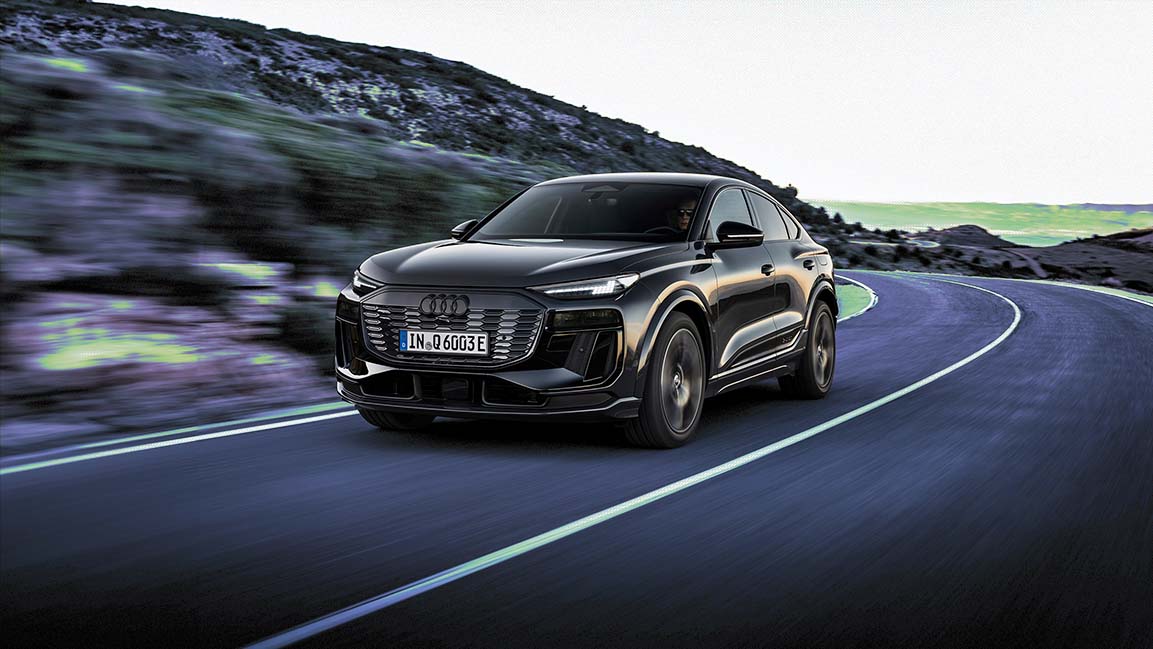- | 9:30 am
Will Audi Q6 e-tron’s advanced tech mark the future of mobility in the Middle East?
The Audi Q6 e-tron promises to revolutionize electric driving, but will it truly reshape the future of luxury on the roads?

As we enter a future dominated by electric mobility, luxury automakers want to redefine the driving experience. While the shift toward sustainability remains a priority, the focus hasn’t deviated from efficiency—fixating on exquisite design and performance.
Audi’s new Q6 e-tron offers a preview of the future of electric driving. This release marks not only the introduction of a new model but the dawn of a new era for Audi.
In an interview with René Koneberg, Managing Director of Audi Middle East, he explains how the Audi Q6 e-tron plays a pivotal role in shaping the future of electric mobility in the region.
A NEW ERA
The Q6 e-tron marks the beginning of Audi’s most extensive rollout to date, signaling a new era defined by technology and innovative design, highlights Koneberg.
One of the standout features is the Digital Stage, which offers a fully digital interaction experience through the MMI panoramic display and MMI passenger display, providing a seamless user experience for both the driver and passenger.
Moreover, the Q6 e-tron features innovative active digital light technology for its headlights and rear lights, enabling drivers to customize their vehicle’s lighting patterns. “This advancement goes beyond aesthetics; it significantly enhances road safety,” emphasizes Koneberg.
The vehicle’s range and charging capabilities are impressive. It features 800-volt technology that allows it to charge from 10% to 80% in just 21 minutes. An electric range of up to 625 kilometers sets a new benchmark within the Audi portfolio and across the segment.
He adds that Audi also has an exciting lineup of new models and derivatives for the Middle East. “We are amid the largest product offensive in Audi’s history, with over 20 new models and their variants set to launch over the next two years.” This includes not only electric vehicles but also Audi Sport models across our SUV and sedan ranges.
“Our focus is on delivering vehicles that resonate with the specific needs of our customers.”
ELECTRIC MOBILITY
The shift towards electric vehicles (EVs) in the Middle East is gaining momentum, particularly in countries like the UAE, Saudi Arabia, and Oman, where sustainability is a top priority.
“Together with our regional partners, Audi is actively contributing to this transition by investing in EV infrastructure across the region. We’ve installed over 100 chargers, with plans to increase to 155 by 2024, including 28 high-performance chargers.”
Governments, automakers, and private companies must collaborate more effectively to facilitate widespread EV adoption. This collective effort should prioritize expanding charging networks and introducing incentives to encourage EV ownership.
While some regions have experienced slower growth, Audi remains optimistic about the future of electric mobility. The Middle East presents a distinctive opportunity driven by a growing commitment to sustainability and a strong demand for innovative technology.
Audi is dedicated to providing at least one electric model across all core segments by 2027 and intends to phase out combustion engines by 2033. “In line with this commitment, Audi plans to introduce 20 new models, including variants, over the next two years, with 50% of these being electric.”
This transformation starts with production, he highlights.
Audi’s main plant in Ingolstadt has been operating under net carbon-neutral conditions since 2024. Audi Brussels led the way in 2018, followed by Audi Hungaria and Böllinger Höfe in 2020. By 2025, the transition will be completed with the Neckarsulm and San José Chiapa (Mexico) facilities, ensuring all Audi locations worldwide achieve net carbon neutrality.
Audi provides plug-in hybrid models in various global markets. “While these models are not currently available in the Middle East, we are actively monitoring the region’s demand and interest in hybrid solutions.” As the market continues to evolve and customer preferences shift, Audi is open to exploring the introduction of plug-in hybrids in this region.
As of today, Audi has established itself as a leading player in the global EV market, including in the Middle East.
“We’re confident that our comprehensive EV portfolio—spanning models like the Q6 e-tron, e-tron GT, and Q8 e-tron—positions us well to capture the growing demand for luxury EVs in the region.”
By 2027, Audi plans to offer an electric model in every core segment, ensuring that customers in the Middle East have access to a full range of premium electric vehicles.
THE DRIVE AHEAD
Koneberg’s long-term growth strategy for the Middle East is built around three key pillars: electrification, digital transformation, and customer experience. Electrification remains a top priority, with ongoing investments in EV infrastructure, the launch of new models, and collaborations with local partners to accelerate EV adoption.
“Our digital transformation initiatives, including the rollout of CRM 2.0, are designed to enhance customer interactions and optimize dealership operations,” he adds.
Audi is also modernizing its retail spaces to support these objectives, introducing innovative concepts like the Progressive Showroom Concept at various locations.







































